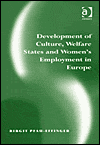Development of Culture, Welfare States and Women's Employment in Europe
This refreshing volume introduces a theory for explaining cross-national differences in the social practice of women (and men) in the areas of family and employment. This provides a theoretical framework for the ensuing comprehensive cross-national analysis of the degree and forms of labour market integration of women in three European countries - Finland, West Germany and the Netherlands - from the 1950s until 2000.\ Cross-national differences are explained with a focus on cultural change...
Search in google:
In light of the increase in women's participation in the labor force in Western European societies over the past few decades, Pfau- Effinger (sociology, U. of Hamburg, Germany) explores the extent to which values and models that people use as orientation for their behavior might play a role in an explanation of international differences with in social phenomena. In particular, she investigates the reasons for cross-national differences in the scope and forms of women's labor force participation, presenting the results of an empirical study of three countries within a theoretical framework she developed for the analysis. Annotation ©2004 Book News, Inc., Portland, OR
1International differences in women's labour force participation : theoretical approaches132Constructing a theoretical framework for the cross-national comparison : the gender arrangement approach373Designing the empirical analysis634Germany : contradictory modernization - from the housewife to the part-time carer model of the family755The Netherlands : dramatic modernization - towards an Egalitarian, family-oriented model1036Finland : from the family economic model to the dual breadwinner model1317Development paths of gender arrangements and labour market integration1478Exploring the differences in the development of gender arrangements1619Conclusion171








